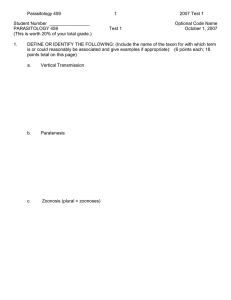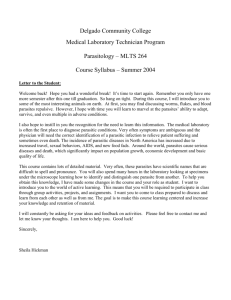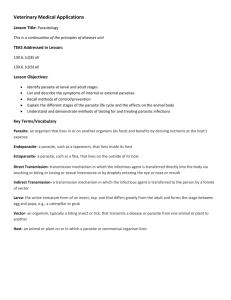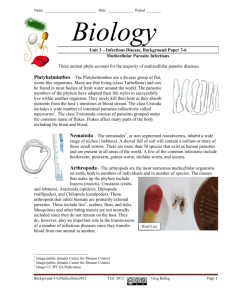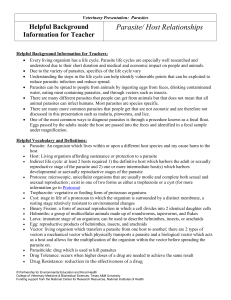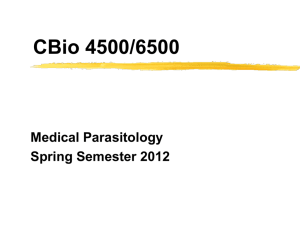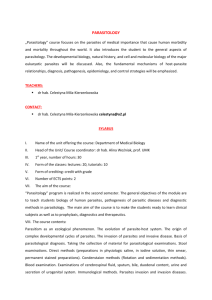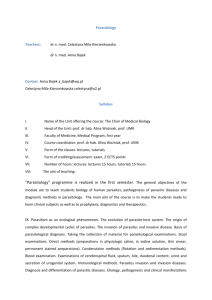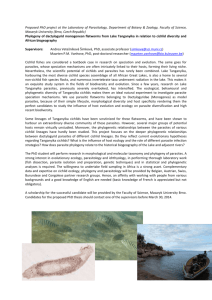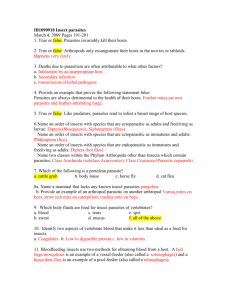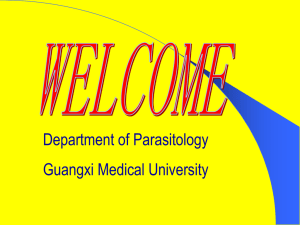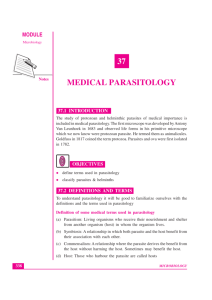Parasitology - Blackboard - The George Washington University
advertisement
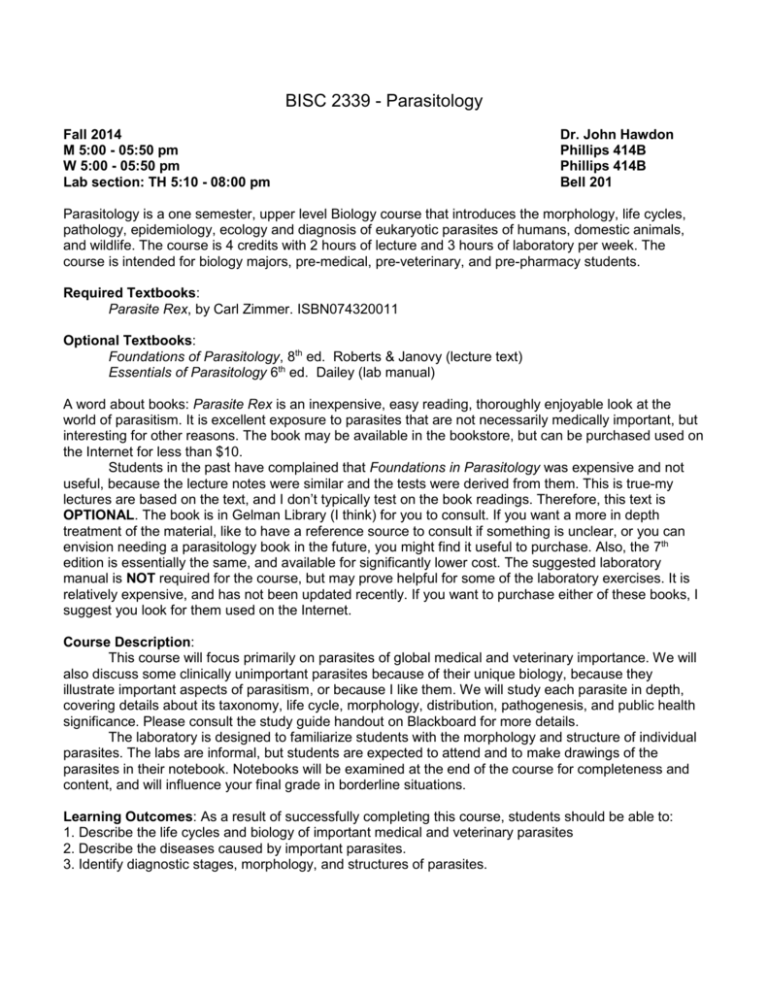
BISC 2339 - Parasitology Fall 2014 M 5:00 - 05:50 pm W 5:00 - 05:50 pm Lab section: TH 5:10 - 08:00 pm Dr. John Hawdon Phillips 414B Phillips 414B Bell 201 Parasitology is a one semester, upper level Biology course that introduces the morphology, life cycles, pathology, epidemiology, ecology and diagnosis of eukaryotic parasites of humans, domestic animals, and wildlife. The course is 4 credits with 2 hours of lecture and 3 hours of laboratory per week. The course is intended for biology majors, pre-medical, pre-veterinary, and pre-pharmacy students. Required Textbooks: Parasite Rex, by Carl Zimmer. ISBN074320011 Optional Textbooks: Foundations of Parasitology, 8th ed. Roberts & Janovy (lecture text) Essentials of Parasitology 6th ed. Dailey (lab manual) A word about books: Parasite Rex is an inexpensive, easy reading, thoroughly enjoyable look at the world of parasitism. It is excellent exposure to parasites that are not necessarily medically important, but interesting for other reasons. The book may be available in the bookstore, but can be purchased used on the Internet for less than $10. Students in the past have complained that Foundations in Parasitology was expensive and not useful, because the lecture notes were similar and the tests were derived from them. This is true-my lectures are based on the text, and I don’t typically test on the book readings. Therefore, this text is OPTIONAL. The book is in Gelman Library (I think) for you to consult. If you want a more in depth treatment of the material, like to have a reference source to consult if something is unclear, or you can envision needing a parasitology book in the future, you might find it useful to purchase. Also, the 7th edition is essentially the same, and available for significantly lower cost. The suggested laboratory manual is NOT required for the course, but may prove helpful for some of the laboratory exercises. It is relatively expensive, and has not been updated recently. If you want to purchase either of these books, I suggest you look for them used on the Internet. Course Description: This course will focus primarily on parasites of global medical and veterinary importance. We will also discuss some clinically unimportant parasites because of their unique biology, because they illustrate important aspects of parasitism, or because I like them. We will study each parasite in depth, covering details about its taxonomy, life cycle, morphology, distribution, pathogenesis, and public health significance. Please consult the study guide handout on Blackboard for more details. The laboratory is designed to familiarize students with the morphology and structure of individual parasites. The labs are informal, but students are expected to attend and to make drawings of the parasites in their notebook. Notebooks will be examined at the end of the course for completeness and content, and will influence your final grade in borderline situations. Learning Outcomes: As a result of successfully completing this course, students should be able to: 1. Describe the life cycles and biology of important medical and veterinary parasites 2. Describe the diseases caused by important parasites. 3. Identify diagnostic stages, morphology, and structures of parasites. Course Requirements: This syllabus represents the basic framework of this class. However, I RESERVE THE RIGHT TO CHANGE IT IF IT BECOMES NECESSARY. This would only happen if we get behind, or want to pursue a topic for more time than I have allowed for that topic. You will get plenty of warning if I do have to change the syllabus. Grading – The course grade is based on the arithmetic mean of 6 equally weighted exams, 10 quizzes and a paper, for a total of 800 points. There will be 3 lecture exams and 3 laboratory exams. Laboratory exam 1 will be 100 points, and laboratory exams 2 and 3 will be 50 points each. The final exam will be based on material covered since the previous exam, and will NOT be comprehensive. Quizzes will be given at the beginning of each lab (except on lab exam days), including the first lab on August 28th. The quizzes will be 20 points, and will cover the material presented in lecture during the week, as well as readings for the day’s laboratory on Blackboard and from Parasite Rex. The lowest quiz grade may be dropped at the discretion of the instructor. The grading scale is: B+ 87-89 C+ 77-79 D+ 67-69 A 94-100 B 85-86 C 74-76 D 64-66 A- 90-93 B- 80-83 C- 70-73 D- 60-63 A final curve is possible but not guaranteed. There is NO extra credit – don’t bother asking. Paper: The paper will be 6-10 double-spaced pages, and must focus on a parasite that we do not discuss in class, or an in depth analysis of an area about a covered parasite that we haven’t covered. The paper should discuss the life cycle, including hosts and developmental stages, its medical, veterinary or ecological importance, and any other interesting tidbits. Acceptable sources are the primary literature (journal articles and reviews). You must cite a minimum of 3 journal articles. Textbooks are allowed, but do not count as journals. Websites are NOT considered primary sources, and are therefore do not count toward the minimum number of journals. You must cite any websites that you consult. You can write the paper in one of several styles – creativity is rewarded: 1. A day in the life: Pick a parasite and write the paper from its point of view. 2. Parasites in the news: Pick a parasite from the news. These tend to be medically related, and consequently ones we discuss in class. Therefore, you will need to discuss aspects not covered in class. 3. Interview a parasite. 4. Other approved styles, including a straight research paper. Your paper topic and style must be approved by the instructor. Optional detailed outlines may be submitted for instructor approval NO LATER than 1 month before the due date. A list of potential topics and sources has been posted on Blackboard. There are many others out there. A few topics I DON”T like: Immunology of protozoan infections Immunology in general Description of a new species Clinical topics Word of advice: Do not wait until the last minute to choose and begin researching your topic. Many of the articles you need must be obtained through the library consortium or through Interlibrary Loan, which takes time. The paper must be submitted as a hard copy (printed) AND by email. I am not a printing service. Also, a broken printer is not an excuse – go to Kinkos. The printed copy of the paper is due by the end of class time before the Thanksgiving break. I will not accept late papers without prior arrangement. Papers must adhere to the following formatting guidelines. Points will be deducted if they do not. Paper length should be 6 -10 pages (not including the bibliography) double-spaced, one inch margins all around, Times New Roman or Arial 12 point fonts ONLY. Figures may be included at the end of the paper and do not count toward the page total. All information that is not yours (including pictures) must be cited (see Academic Integrity below). In the text, citations may be numbered or by name (e.g. Hawdon et al 2002). The bibliography must be at the end of the document (NO FOOTNOTES), and contain all authors, the year, the complete title, the complete name of the journal, and the volume and page numbers. I don’t care what style you use, other than it meeting the above requirements and that it be consistent throughout the paper. Here is an example: Hawdon, J. M. and Schad, G. A., 1990. Serum stimulated feeding in vitro by third stage infective larvae of the canine hookworm Ancylostoma caninum. Journal of Parasitology 76: 394-398. Your paper must include the following statement at the bottom of the title page: I, [your name here], have completed this work in accordance with The George Washington University Code of Academic Integrity. [your signature] Papers without this signed statement will be considered incomplete and not accepted. Exams – Lecture exams are based on the material presented in class and the reading, and will include matching, multiple choice, true false, fill in the blank, and short answer. Lab tests are practical, and involve identification of organisms, morphological features, diagnostic stages, etc. Makeup policy – FAILURE TO APPEAR AT AN EXAM WITHOUT LETTING ME KNOW IN ADVANCE WILL RESULT IN AN “F” ON THAT EXAM. If you have a legitimate reason for missing an exam, you will be permitted to make it up. Legitimate excuses include illness (with a note from your physician), and documented deaths in the family. Make ups for any other excuses are at the instructor’s discretion. If I am not convinced about the legitimacy of you excuse, you will get a zero on the exam. No more than one lecture exam may be made up in a semester. The make up exam will cover the same material, but may be different than the regular exam, most likely in essay format, and more difficult. The exam must be made up within 1 week of the regular exam date. If you know beforehand that you will be unable to take the exam on the scheduled date, you must make prior arrangements to take it on an alternate date. You are responsible for arranging a time for the makeup at my convenience. THERE IS NO MAKEUP OF LAB EXAMS OR QUIZZES! All papers and exams must be completed to pass this course. Attendance – Students are expected to attend, but attendance is not a component of the grade. You are responsible for obtaining any missed lecture notes from a classmate or Blackboard. You are also responsible for any general information about the course imparted during class. Labs cannot be made up. Please be punctual – late entry interrupts the class. Students should notify faculty during the first week of the semester of their intention to be absent from class on their day(s) of religious observance. Lab materials – Unlined paper for drawing in a bound notebook or a 3 ring binder and colored drawing pencils are required. All other lab materials will be provided to the students. A dissection kit may be useful for several labs. Cell phone policy – Turn off your cell phone before coming to class. If your cell phone rings, I will stop class while you answer the phone in front of us. Potentially embarrassing comments from me may follow. The same applies for texting. I will read the text to the entire class, and hilarity may ensue. Repeat offenders will be asked to leave the classroom. Only people with children or other similar, pre-approved situations are permitted to have their cell phones on during class. Office hours - My office is 519 Ross Hall, and my extension is 4-2652. You can also reach me by e-mail at jhawdon@gwu.edu. I will generally be available in my office on Wednesdays from 11:00-12:00 if you need to see me. I pretty much have an open door policy, so if you want to talk about parasites you can drop by most any time, although it is always best to call ahead or arrange a meeting beforehand so you don’t come all the way to Ross Hall to find out I’m in a meeting or out of the office. Academic Integrity – All graded work must be completed in accordance with The George Washington University Code of Academic Integrity. I take academic dishonesty very seriously. Academic dishonesty includes cheating, plagiarism, fabrication, falsification, or other actions that violate commonly accepted intellectual and ethical standards within academic and scientific communities. If you are caught cheating, you will minimally receive a zero for that assignment. I reserve the right to fail you for the course, depending on the severity of the infraction. For example, accidentally omitting a citation may cost a letter grade, copying a website may earn a zero for the assignment, and purchasing a term paper may result in an F for the course. In any case, you will be reported to the Office of Academic Integrity, and the infraction will be recorded in your academic record. Be especially careful regarding plagiarism when writing your paper. I suggest you read the material about plagiarism from Plagiarism.org that I posted in the Course Materials folder on Blackboard, and visit the site if you have questions. If you are unsure about anything, please ask me. For the remainder of the code, see: http://www.gwu.edu/~ntegrity/code.html Disability Services - Any student who feels s/he may need an accommodation based on the impact of a disability should contact me privately to discuss specific needs. Please contact the Disability Support Services office at 202.994.8250 in Rome Hall, Suite 102, to establish eligibility and to coordinate reasonable accommodations. For additional information please refer to: http://gwired.gwu.edu/dss/. University Counseling Center - The University Counseling Center (UCC) offers 24/7 assistance and referral to address students' personal, social, career, and study skills problems. Services for students include crisis and emergency mental health consultations, confidential assessment, counseling services (individual and small group), and referrals. You can contact UCC at 202-994-5300. For more information, see the website: http://counselingcenter.gwu.edu/about-us Comments - This course in content-intensive and includes memorization of things like life cycles and scientific names. In my experience, waiting until the night before the exam to attempt to cram 15 life cycles into you head is not a successful strategy for achieving a passing grade or learning the material. The weekly quizzes are designed to help you keep up with the material. Please consult “How to Get an A” in Course documents on Blackboard for hints from a former student. Security - In the case of an emergency, if at all possible, the class should shelter in place. If the building that the class is in is affected, follow the evacuation procedures for the building. After evacuation, seek shelter at a predetermined rendezvous location. CLASS SCHEDULE This schedule is subject to change. All changes will be announced. PR = Parasite Rex; on these days, the listed chapters will be included in the quiz. The readings refer to the optional textbook “Foundations of Parasitology” 8th edition. DATE LECTURE TOPIC READING 8/25 8/27 8/28 9/1 9/3 9/4 9/8 9/10 9/11 9/15 9/17 9/18 9/22 9/24 9/25 9/29 10/1 10/2 10/6 10/8 10/9 10/13 10/15 10/16 10/20 10/22 10/23 10/27 10/29 10/30 11/3 11/5 11/6 11/10 11/12 11/13 11/17 11/19 11/20 11/24 11/26 11/27 12/1 12/3 12/4 TBA Introduction – The nature of parasitism Intro to the Protozoa ---Labor Day – No Class Trypanosomes ---Leishmania and other flagellates Amoebae and ciliates ---Malaria I Malaria II ---Other Apicomplexa Intro to Platyhelminths; the Monogenes ---LECTURE EXAM I Trematodes I - Digenean life cycles ---Trematodes II - Blood flukes Trematodes III – other flukes ---Cestode I - life cycles Cestodes II ---Cestodes III Intro to Nematodes ---LECTURE EXAM II Enopleans & Rhabditids ---Bursate nematodes 1 - hookworms Bursate nematodes 2 - trichostrongyles ---Ascarids & Oxyurids Filarids and Guinea worm ---Arthropods I Arthropods II ---TBA No Class ---TBA TBA ---LECTURE EXAM III (FINAL) Ch. 1, 2 Ch. 4 ------Ch. 5 LABORATORY Ch. 5, 6 Ch. 7, 10 ---Ch. 9 Ch. 9 ---Ch. 8 Ch. 13, 19 ------Ch. 15 ---Ch. 16 Ch. 17, 18 ---Ch. 20 Ch. 21 ----Ch. 21 Ch. 22 ------Ch. 23 ---Ch. 25 Ch. 25 ---Ch. 26, 27 Ch. 29, 30 ---Ch. 33, 36, 38 Ch. 37, 39, 41 ---- ---Symbiosis; Microscope Use ------Intro to protozoa; Trypanosomes ------Leishmania; intestinal protozoa; PR 1-2 ------Malaria ------Coccidia & Gregarines ------LAB EXAM I ------Platyhelminths; Monogenes; PR 3-4 ------Digenes ------Cestodes; PR 5-6 ------LAB EXAM II ------Nematodes I ------Nematodes II ------Arthropods filarids; PR 7-8 ------- ---Thanksgiving – No class ---your notes LAB EXAM III ----
